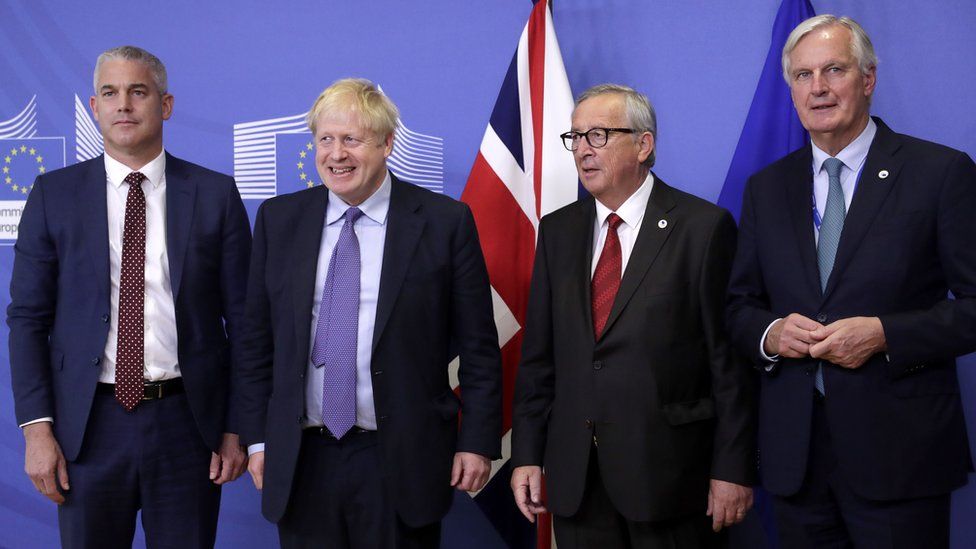Brexit deal: What just happened?
- Published

UK and EU leaders stood on a stage in Brussels on Thursday and declared that a Brexit deal had, finally, been done.
Negotiations had gone on past the supposed deadline, and top officials had thought it was far too late, but in the end it happened.
Except this is Brexit – and of course, it's not that simple.
Here's what's happening.
A Brexit deal has been agreed. Does that mean it's all done?
No. Any deal needs to be approved by the UK Parliament and across the EU. The last time this happened, UK PM Theresa May failed to get her deal approved three times by the House of Commons before resigning.
The new PM, Boris Johnson, has geared his entire leadership around getting Brexit done by 31 October.
But he still faces the same battle to get a divided Commons to agree to his deal.
And to make matters more complicated, he needs to get it done on Saturday to avoid a third Brexit extension.
Boris Johnson says he has struck "a great new deal" to accomplish Brexit - but still faces an uphill struggle.
If that sounds familiar, it's because we've been here before.
Leaving the EU is not as simple as it sounds. There are trade deals, travel restrictions, citizens' rights and more to think about.
So a "divorce agreement" was drawn up after 18 months of negotiations, and presented to the UK Parliament a year ago. It was to be rejected three times.
The main sticking point was the Irish border between the UK and EU after Brexit.
The UK and EU agreed a "backstop" - a guarantee there would be no return to a hard border between Northern Ireland and the Republic of Ireland with checks, police, or soldiers - because of decades of violence in Northern Ireland in the past.
The backstop could have meant Northern Ireland being treated differently from the rest of the UK - or, as in the final draft, the entire UK staying "aligned" with the EU.
Northern Ireland's Democratic Unionist Party (or DUP) was fiercely against either option - and the party remains a key source of votes needed to get a deal done.
Allow Twitter content?
This article contains content provided by Twitter. We ask for your permission before anything is loaded, as they may be using cookies and other technologies. You may want to read Twitter’s cookie policy, external and privacy policy, external before accepting. To view this content choose ‘accept and continue’.
Boris Johnson took over as UK prime minister in 2019, promising that the UK would leave on 31 October no matter what.
He insisted he could renegotiate the first deal, to get rid of the problematic backstop.
After weeks of negotiations that seemed to be going nowhere, another deal was struck on Thursday.
The EU's top negotiator declared the backstop has been abolished. But not everyone is happy with the replacement.
The new deal means Northern Ireland will stick to some EU rules, while technically still being in the UK customs area. Crucially, some checks will still take place between Britain and Northern Ireland.
Four years after it comes into effect, Northern Ireland's politicians will have a say on whether to keep the deal going.
Hours after the deal was announced, EU leaders endorsed it.
Mr Johnson has until Saturday 19 October to get his deal across the line in the UK Parliament - or else he is legally required to request an extension to Brexit.
This week, MPs in London will have their first Saturday session since 1982 - and that was at the start of the Falklands War.
So now everyone is waiting to see if Mr Johnson can sell this new deal to a sceptical UK Parliament.
But Mr Johnson's allies from Northern Ireland, the Democratic Unionist Party, do not like the deal and say they will vote against him. And the main opposition Labour Party says the deal doesn't address its concerns either.
And even if this deal falls apart and an extension is asked for, there's no guarantee the EU will give one.
- Published21 October 2019
- Published13 July 2020